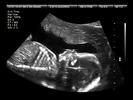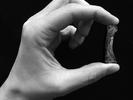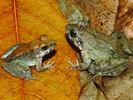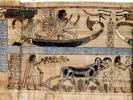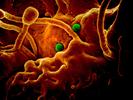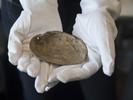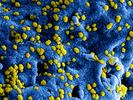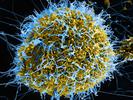Nell Greenfieldboyce appears in the following:
Monday, February 02, 2015
By
Nell Greenfieldboyce
Construction is starting in Chile on a new sort of telescope. One aim is to survey huge swaths of sky for faint signals of a "Planet X" that may be lurking on the farthest edges of our solar system.
Monday, January 26, 2015
By
Nell Greenfieldboyce
A simple blood test can analyze bits of fetal DNA leaked in the mother's bloodstream. It's less risky than invasive alternatives like amniocentesis, but it doesn't tell as much about fetal health.
Thursday, January 22, 2015
By
Nell Greenfieldboyce
The opposable thumb you use to hold a pencil was long thought to be a defining aspect of humans. But an analysis of finger bones suggests stone tool use by pre-humans — perhaps 3 million years ago.
Thursday, January 15, 2015
By
Nell Greenfieldboyce
The bar-headed goose is famous for its long, annual migration from the Indian subcontinent to central Asia, a flight that takes it over snowcapped Himalaya Mountains so high and dangerous that human climbers struggle just to stay alive.
Scientists had thought these birds might fly up to a high altitude ...
Monday, January 05, 2015
By
Nell Greenfieldboyce
Once you become the boss, it's likely that you'll start to speak quite differently. The pitch, resonance and intensity of your speech change in ways that listeners can detect as signs of power.
Friday, January 02, 2015
By
Nell Greenfieldboyce
The influenza season is under way and experts at the Centers for Disease Control and Prevention warn it may be particularly severe. We have an update on the flu and what you can do to protect yourself.
Thursday, January 01, 2015
By
Nell Greenfieldboyce
Who needs eggs? Scientists have discovered an unusual frog species that gives birth to live tadpoles.
Monday, December 22, 2014
By
Nell Greenfieldboyce
Humans have lighter bones than other primates, and that change happened a lot later than anthropologists had thought. Blame our sedentary ways after our ancestors took up farming.
Thursday, December 18, 2014
By
Nell Greenfieldboyce
Some researchers who study the virus that causes Middle East respiratory syndrome got an early Christmas present: permission to resume experiments that the federal government abruptly halted in October.
The scientists were trying to modify the MERS virus so that it's better able to sicken mice. Their goal is ...
Thursday, December 18, 2014
By
Nell Greenfieldboyce /
NPR/TED Staff
Remember that worrisome new form of botulinum toxin we told you about in late 2013, the one that supposedly had to be kept secret out of fear it could be used as a bioweapon that would evade all of our medical defenses?
Well, as it turns out, it's not ...
Thursday, December 18, 2014
By
Jason Beaubien /
Nell Greenfieldboyce
Between the rugged terrain and the constant terrorist threats, vaccinating Pakistani children against common diseases hasn't been easy. Mountains make it hard — at times even impossible — for vaccinators to reach people in the north. In the south, health workers have to use four-wheelers and camels to travel through ...
Tuesday, December 16, 2014
By
Nell Greenfieldboyce
Imagine that scientists wanted to take Ebola virus and see if it could ever become airborne by deliberately causing mutations in the lab and then searching through those new viruses to see if any spread easily through the air.
Would that be OK?
The question was posed by David ...
Wednesday, December 03, 2014
By
Nell Greenfieldboyce
Carved zigzag marks on a shell found more than a century ago have drawn new interest from archaeologists. The half-million-year-old lines aren't from an animal, and might be art from Homo erectus.
Thursday, November 27, 2014
By
Nell Greenfieldboyce
Lab scientists are trying to understand why some corpses buried in northwestern Poland were singled out for special anti-vampire treatments, such as putting a sickle around the neck.
Wednesday, November 26, 2014
By
Nell Greenfieldboyce
A new study looks at the future of the Canadian Arctic Archipelago and finds that by the end of this century, the region might be ice-free for 2 to 5 months, something that puts bears in grave peril.
Friday, November 14, 2014
By
Nell Greenfieldboyce /
Geoff Brumfiel
After a major investigation into America's nuclear forces, Secretary of Defense Chuck Hagel says that he will be investing billions of dollars into the system, and changing to the way it's managed.
Friday, November 14, 2014
By
Nell Greenfieldboyce
A scientist who contributed to this week's triumphant comet landing mission has upset people by wearing a loud shirt that some say is sexist. On Twitter, people have dubbed the dispute "shirtstorm."
Monday, November 10, 2014
By
Nell Greenfieldboyce
Never mind the physics. Color isn't just a particular wavelength of light, it turns out. It's a fascinating mix of context and what's happening outside and inside your head.
Friday, November 07, 2014
By
Nell Greenfieldboyce
The U.S. government has stopped some experiments with dangerous viruses, saying the risks need to be reconsidered. Key work in one scientist's lab has been halted.
Friday, October 31, 2014
By
Nell Greenfieldboyce
Big questions have bedeviled virus hunters for 38 years: Why do people differ in their response to Ebola? Is it becoming more or less dangerous? There's now more evidence about who gets sick and why.


